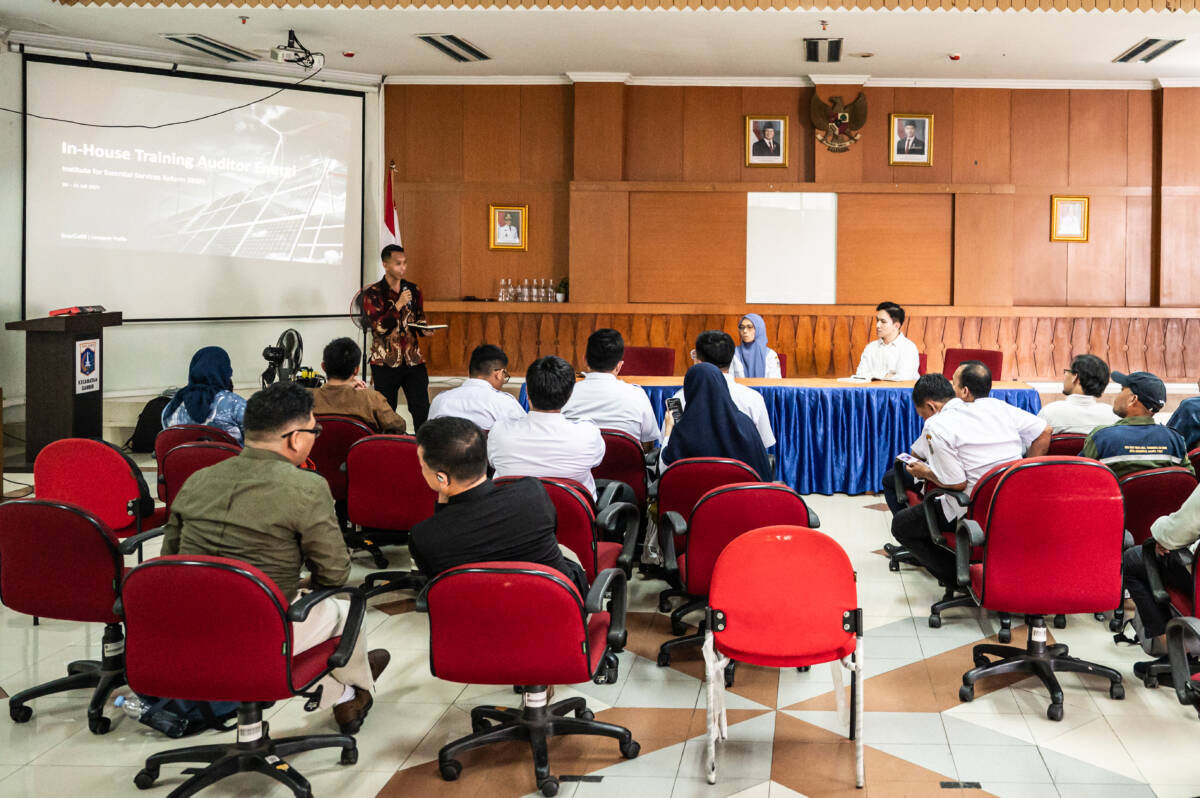Jakarta, August 28, 2025 – Implementing energy management in government buildings is essential to advancing energy conservation and reducing greenhouse gas emissions. However, understanding and expertise in applying energy management practices among civil servants remain limited. To address this, the Institute for Essential Services Reform (IESR), through the Sustainable Energy Transition Indonesia (SETI) project, organized a capacity-building training for 27 civil servants (ASN), as well as managers and supervisors of government buildings in Jakarta.
The training, held on July 30–31, 2025, was conducted in collaboration with certified auditor Yuli Safangat. It is expected to strengthen the implementation of a brief energy audit (walkthrough energy audit) currently being carried out by the Central Jakarta Municipal Government across eight sub-district office buildings.
Malindo Wardana, SETI Project Manager at IESR, explained that a comprehensive understanding of energy consumption patterns in buildings will help identify opportunities for significant energy savings.
“This understanding will be valuable in promoting the implementation of sustainable energy management and conservation at the city level, as part of the strategy to achieve national energy efficiency targets and reduce greenhouse gas emissions,” he said.
He further noted that Jakarta, with its high building density and vibrant economic activity, has significant potential to develop energy-saving services and industries, including energy audit services, if government buildings consistently apply energy management practices. At present, the demand for energy audits remains limited. By setting an example, government buildings can demonstrate the benefits and encourage wider adoption of these practices across other buildings.
The SETI project focuses on industrial decarbonization and the decarbonization of the built environment through renewable energy use and energy conservation. It is funded by the Internationale Klimaschutzinitiative (IKI) of the Federal Ministry for Economic Affairs and Climate Action (BMWK), Government of Germany, in collaboration with the Directorate General of New, Renewable Energy, and Energy Conservation (DJ EBTKE), Ministry of Energy and Mineral Resources (ESDM).
Radityo Yudanto, Policy Analyst, Energy Conservation Supervision Division, Directorate General of New, Renewable Energy, and Energy Conservation, Ministry of Energy and Mineral Resources, stated that the government has developed the Online Energy Management Reporting System (POME) to facilitate agencies and business entities in submitting their annual reports. Through this system, data on energy use, equipment, and planned efficiency measures can be collected to inform and support energy conservation policy-making. In line with Government Regulation (PP) No. 33/2023, the government requires buildings or business entities with a minimum consumption of 500 TOE per year, equivalent to 5,815 MWh of electricity or an energy bill of around IDR 500 million per month, to implement energy management practices.
Radityo noted that in 2024, 54 buildings implemented and reported their energy management activities, consisting of 34 commercial buildings and 20 government buildings. These reports recorded energy savings of 51 GWh and an emission reduction of approximately 36,628 tons of CO₂e, from a total energy consumption of 506 GWh. Of this total, government buildings accounted for just 4% of energy use, while commercial buildings contributed 96%.
“Energy conservation and efficiency measures in buildings typically include adjusting equipment operations (operating hours, room temperature), modifying equipment (installing sensors, applying window film), replacing equipment (LED lights, energy-efficient air conditioners), and additional steps such as installing rooftop solar panels,” he explained.
The largest energy savings were achieved from lighting systems (46%), followed by cooling (37%), building transportation systems (10%), and office equipment (7%).
However, the trend of energy reporting has declined due to several challenges: it is not yet integrated into agency performance evaluations, there is no reward or penalty system, employee transfers often occur without proper knowledge transfer, and changes in agency nomenclature create additional barriers.
During the training session, instructor Yuli Safangat explained that an energy audit is a systematic approach to identifying, measuring, and reporting opportunities to improve energy performance within a defined scope. The process includes planning, forming an audit team, gathering general and technical data, and conducting field measurements using tools such as digital anemometers for HVAC systems or digital power meters for electrical parameters.
Energy conservation, energy management, energy efficiency, IESR, government buildings, civil servant training, energy audits, decarbonization, greenhouse gas emissions, SETI, EBTKE ESDM, POME, Jakarta.

